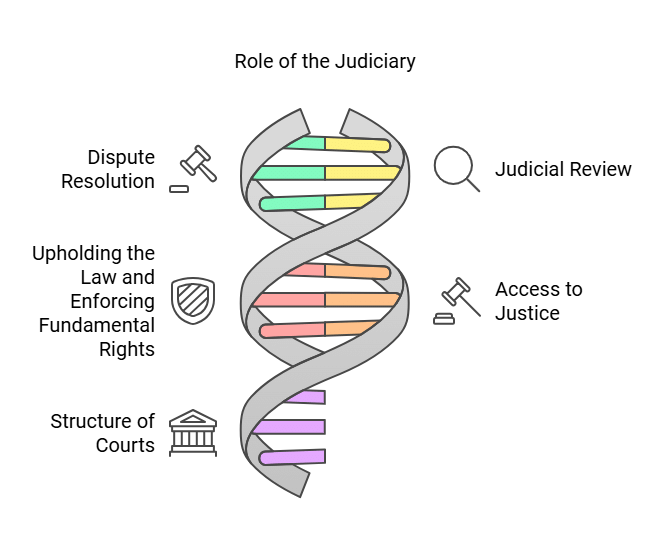Class 8 Civics Chapter 5 Notes - Judiciary
Introduction
Laws are intended to be applied fairly to everyone. To uphold the rule of law, we have a judicial system consisting of courts where individuals can seek assistance when laws are violated. As a branch of government, the judiciary plays an important role in the functioning of India's democracy. This role is possible only because the judiciary is independent. Understanding why the independence of the judiciary is essential can be complex, but it is crucial for students to grasp. What does an 'independent judiciary' entail? Is there a link between your local court and the Supreme Court in New Delhi? This chapter will provide answers to these questions.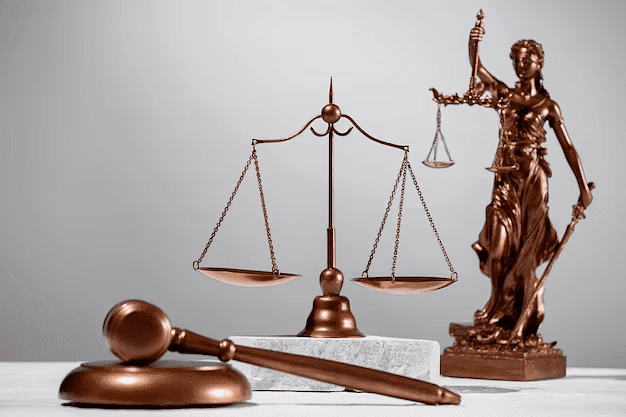
What is the Role of the Judiciary?
- Dispute Resolution: The judicial system offers a way to settle disagreements between citizens, between citizens and the government, between two state governments, and between the central and state governments.
- Judicial Review: As the ultimate interpreter of the Constitution, the judiciary can annul specific laws passed by Parliament if they violate the Constitution's fundamental principles. This process is known as judicial review.
- Upholding the Law and Enforcing Fundamental Rights: The judiciary is essential in safeguarding the Fundamental Rights of citizens, allowing anyone to approach the courts if they feel their rights have been breached.
- Access to Justice: The concept of 'access to justice' highlights the importance of Public Interest Litigation (PIL) in providing justice to those who may not afford legal representation.
- Structure of Courts: The country has three tiers of courts. Most individuals interact with subordinate or district courts, which handle various cases at the district or Tehsil level. Each state has a High Court, the highest court in that state, and the Supreme Court sits at the top.
What is an Independent Judiciary?
- The independence of the judiciary is a key feature of the Constitution.
- This independence means that the legislature and executive branches cannot interfere with the judiciary's work.
- The courts operate independently and do not act on behalf of the government.
- This independence allows the courts to ensure that there is no misuse of power by the legislature and the executive.
- It also plays a crucial role in protecting the Fundamental Rights of citizens.
- Anyone can approach the courts if they believe their rights have been violated.
What is the Structure of Courts in India?
In India, there are three main levels of courts, and their organisation resembles a pyramid, with multiple courts at the lower level and just one at the top.
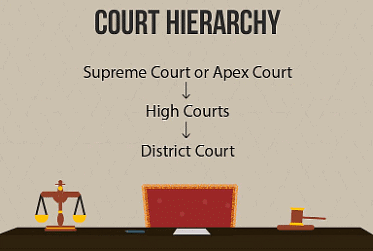
- District Court: These are the courts most people are familiar with, also referred to as subordinate or district courts. They function at the district or Tehsil level and deal with various types of cases. Each state is divided into districts, each overseen by a District Judge.
- High Court: High Courts were initially set up in the three Presidency cities of Calcutta, Bombay, and Madras in 1862. The High Court of Delhi was established in 1966. Currently, there are 25 High Courts in India. Many states have their own High Courts, but Punjab and Haryana share one in Chandigarh. Additionally, four northeastern states—Assam, Nagaland, Mizoram, and Arunachal Pradesh—share a High Court in Guwahati. Andhra Pradesh (Amaravati) and Telangana (Hyderabad) have had separate High Courts since 1 January 2019. Some High Courts have benches in different areas of the state for better access.
- Supreme Court: The Supreme Court, located in New Delhi, is at the pinnacle of the judiciary and is led by the Chief Justice of India. Its decisions are binding on all other courts in the country.
India has a unified judicial system, meaning that decisions from higher courts must be followed by lower courts. If someone thinks a lower court's decision is unfair, they can appeal to a higher court.
What are the Different Branches of the Legal System?
The Indian legal system handles both civil and criminal cases:
Civil Law
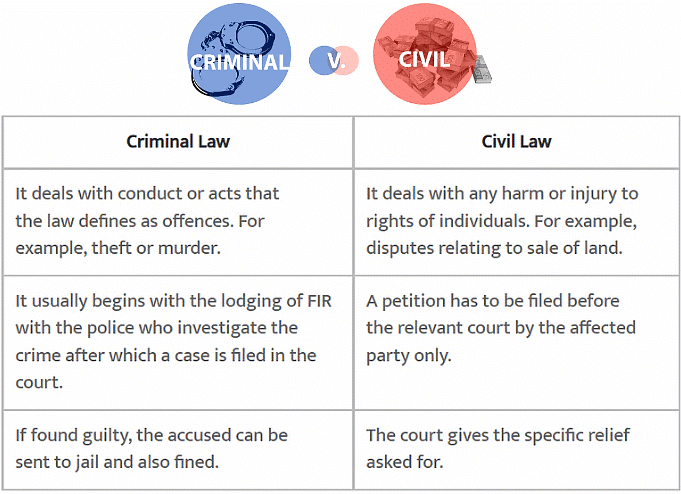
Civil laws address harm or injury to individuals’ rights.
- Common civil disputes include:
- Land sales
- Goods purchases
- Rental issues
- Divorce cases
A petition must be filed in the relevant court by the affected party. A significant civil law enacted in 2006 is the Protection of Women from Domestic Violence Act, 2005, which safeguards women against domestic violence.
Criminal Law
Criminal law involves acts defined as offences, like:
- Theft
- Dowry harassment
- Murder
- Criminal cases typically start with a First Information Report (FIR) lodged with the police.
- The police investigate the crime, leading to a case being filed in court.
- If found guilty, the accused may face jail time and fines.
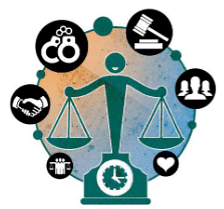
The Role of Courts
- Courts are essential for protecting Fundamental Rights.
- They ensure justice is accessible to all citizens.
- This underscores the judiciary's importance in upholding constitutional principles.
Public Interest Litigation (PIL)
- Public Interest Litigation (PIL) is a legal action aimed at protecting the public interest.
- It addresses issues like rescuing bonded labourers from harsh working conditions.
- PIL also helps in freeing prisoners in Bihar who were held beyond their sentences.
- In the early 1980s, the Supreme Court created PIL to enhance access to justice.
- This allowed anyone to file a PIL in the High Court or Supreme Court for those whose rights were violated.
- The legal process was simplified, allowing even letters or telegrams to be considered as PILs.
- In its early years, PIL addressed many issues, such as rescuing bonded labourers and releasing unjustly imprisoned individuals.
Reasons for Filing PIL

- Violation of basic human rights of the poor
- Issues with government policy or actions
- Compelling municipal authorities to carry out their public duties
- Infringement of religious rights or other fundamental rights
Anyone, whether an individual or an organisation, can file a PIL in the High Court or the Supreme Court for those whose rights are being violated. A personal interest in the matter is not required.
PIL has historically addressed significant issues, such as rescuing bonded labourers from harsh conditions and ensuring the mid-day meal scheme is implemented in schools. These cases highlight the important role of PIL in promoting social justice in India.
Importance of Judiciary
The judiciary has been vital in ensuring democracy in India:
- The judiciary acts as the guardian of the constitution.
- It checks the powers of both the executive and the legislature.
- It protects the Fundamental Rights of citizens.
- The judiciary is essential for dispute resolution, helping to settle issues between individuals, between individuals and the government, between state governments, and between the centre and state governments.
- As the final interpreter of the constitution, the judiciary has the power of judicial review, enabling it to annul laws from Parliament that do not adhere to the constitution's basic structure.
- The independence of the judiciary ensures that courts can prevent misuse of power by the legislature and executive.
- Each state has a High Court, which is the highest court in that state, while the Supreme Court is the top court in the judicial system.

Does Everyone Have Access to the Courts?
- In principle, all citizens of India can access the courts. This means every citizen has a right to justice through the judiciary. However, the legal process often involves significant costs and paperwork, which can discourage poorer individuals from pursuing justice.
- To enhance access to justice, the Supreme Court introduced Public Interest Litigation (PIL) in the 1980s.
- This allows anyone to file a PIL in the High Court or Supreme Court on behalf of those whose rights are being violated. The process was simplified, so even a letter or telegram could be considered a PIL.
- Moreover, it plays an important role in defending the Fundamental Rights of citizens, allowing anyone to approach the courts if they think their rights have been violated. The judiciary also serves as a check on the powers of the executive and the legislature, ensuring the protection of citizens' rights.
FAQs on Class 8 Civics Chapter 5 Notes - Judiciary
| 1. What is the main role of the judiciary in India? |  |
| 2. What does an independent judiciary mean? |  |
| 3. How is the court structure organized in India? |  |
| 4. What is Public Interest Litigation (PIL)? |  |
| 5. Does every individual have access to the courts in India? |  |


